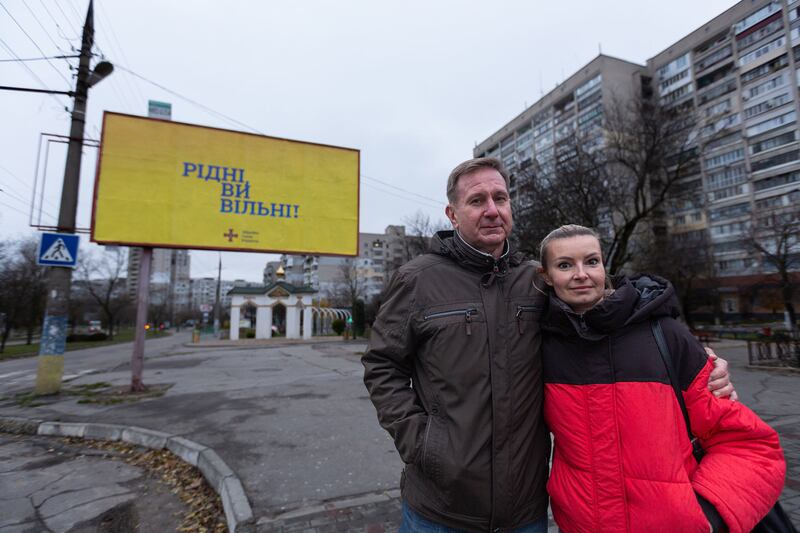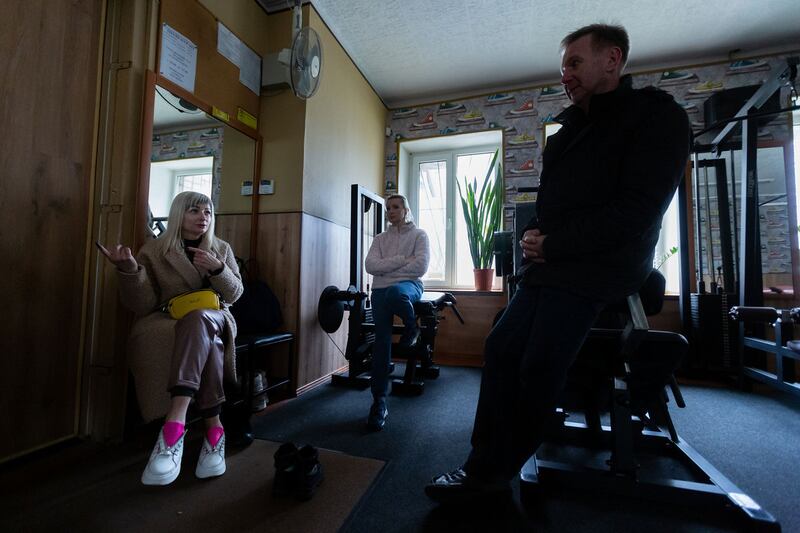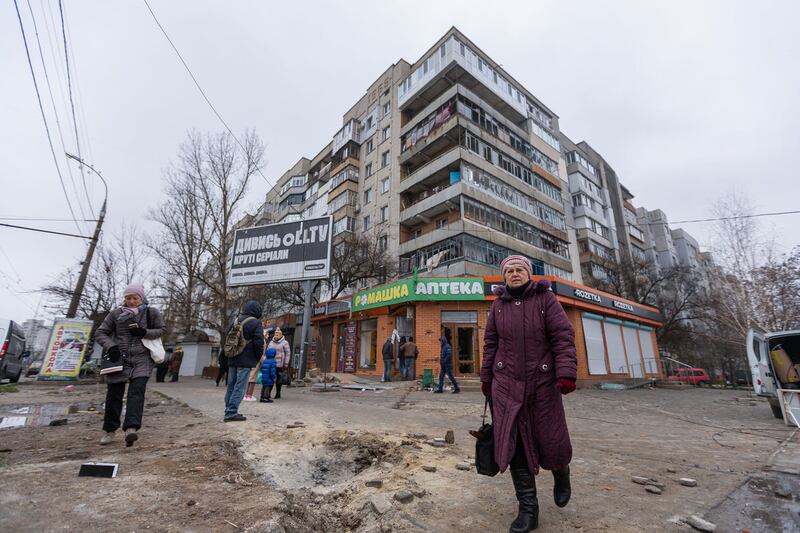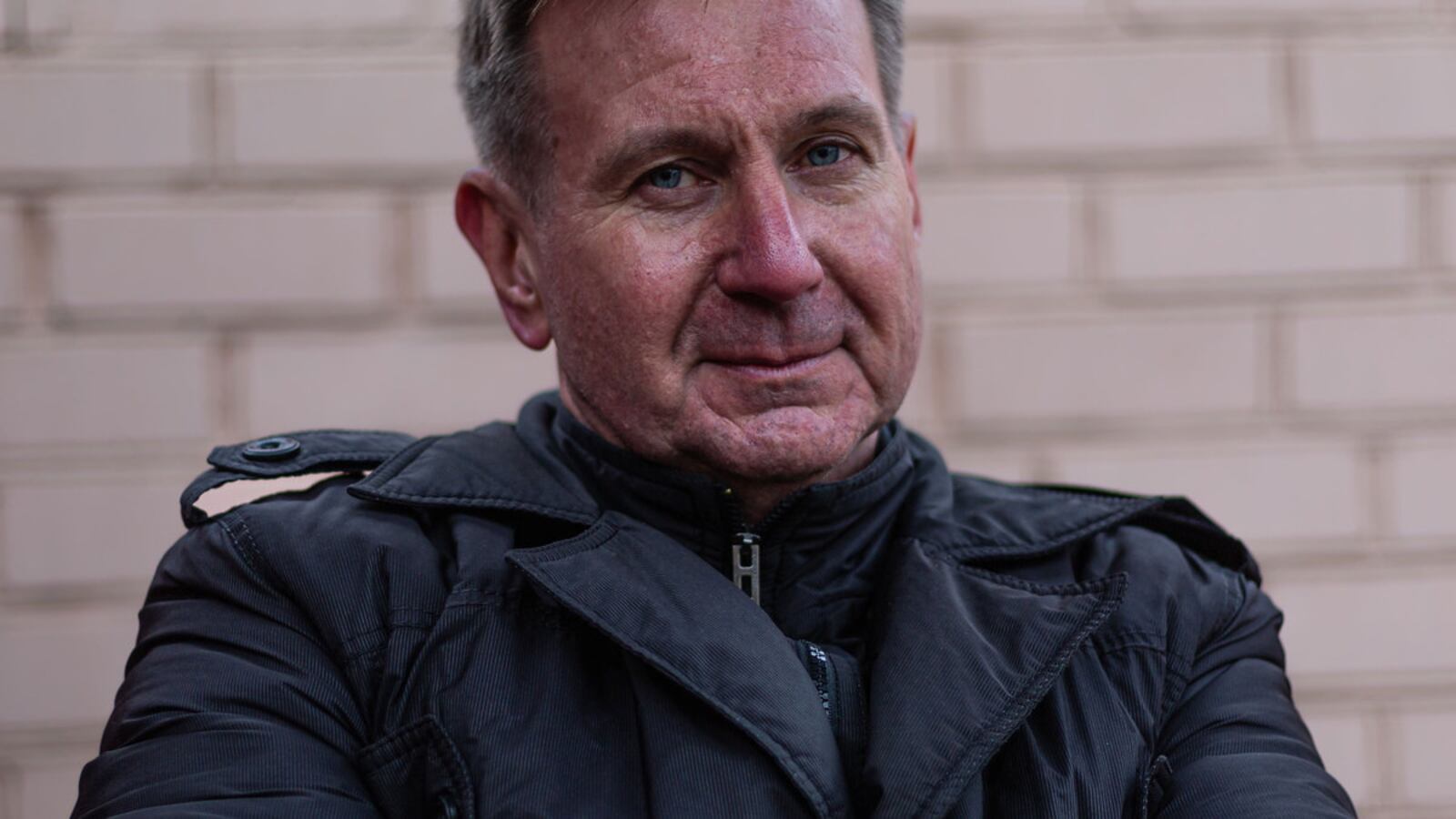KHERSON, Ukraine—As Ukrainian forces fought to kick Russian forces out of Kherson, city resident Kostyantyn Babenko, 49, received a WhatsApp message from one of his old friends in the Armed Forces of Ukraine (AFU) asking him for a favor. Communications like these were no small thing—by now, Babenko’s hometown had been under occupation by Russian forces for nearly seven months.
Due to the risky nature of their relationship, Babenko’s friend only sent him a short, secretive message stating the name of a building in Kherson city. Babenko immediately knew what to do.
That day in September, he “went to the building, [watched] who was there, who was coming, who was going, what cars were coming, what cars were going, [and] wrote down for myself the license plate numbers of all the cars,” he told The Daily Beast. “In this way two days passed.”
Babenko and a trusted friend took turns staking out the location, and Babenko sent the information they gathered to his contact. Although this wasn’t the first time he had gathered intelligence for the Ukrainian army from behind enemy lines, it was his first time relaying it directly to them—putting him at great personal risk.
“There were cases where if the [Russians] saw anything, they’d immediately take people away,” Babenko said. “Those who somewhere showed any evidence that they were working with the AFU, no one ever saw these people again.”
Despite these dangers, Babenko, together with a loose network of collaborators, served as an informant for the AFU throughout the Russian occupation, and frequently reported the details of Russian troop positions, military vehicle movements, weapons transfers, and more to his contact and other members of the Ukrainian military. On several occasions, his intelligence gathering resulted in Ukrainian missile strikes on Russian positions with American-made HIMARS rocket systems.
But outside of his close circle of confidantes, Babenko led a very different life—as a family man, an active community member, and the owner of a neighborhood gym in Kherson, which he had managed for almost 20 years. He kept his head down, outwardly appearing to accept Russia’s occupation of Kherson, and taking great pains to keep his and his co-conspirators’ sympathies for the Ukrainian cause hidden from the public at large.

Kostyantyn Babenko and Hanna Aleksandrova in front of a Ukrainian billboard in Kherson that reads “Countrymen, you are free!”
Daniel Brown“This was a large wagon circle of people,” Babenko said of the group of around 10 fellow informants he worked most closely with. “These were people who we had known for many, many years. We only communicated with people we could trust.”
The hub of the social group that made up this network of spies was Babenko’s gym, simply called “Strong,” which he has been running since 2003. Babenko, who says he can bench 100 kilograms (220 pounds) for up to 10 reps, met several of the friends he would later collaborate with in his intelligence gathering operations by working out with them over the years.
Before the war, Babenko admits that his feelings toward Russia were ambivalent. But after witnessing the brutality of the Russian invasion and the daily indignities of the Russian presence in his city, he, like others, felt he had to do whatever he could to oppose the occupiers, which ultimately led him and his friends to collaborate with the AFU.
“It’s a kind of patriotism, and the possibility to somehow be helpful,” Babenko said, sitting on a bench in his gym. “It was important for us not to just sit here. Morally, it was very difficult [to do nothing].”

Kostyantyn Babenko, Hanna Aleksandrova, and Viktoria at Babenko’s gym
Daniel BrownOn Feb. 24, the day that Russia invaded Ukraine, Babenko’s wife and two daughters left Kherson for safety in the UK. Babenko hasn’t seen them since, and remained in Kherson to take care of his elderly mother and his father, who died of natural causes early in the war.
Shortly after Ukrainian forces left Kherson but before Russian forces took the city on March 2, Babenko and his friends organized nightly patrols, during which Babenko brought along a rifle that one of his military friends had gifted him. Babenko knew several high-ranking Ukrainian military officers who had retired from service but returned to the army at the start of the war. It was through these contacts that he and his trusted teammates began passing information along to the AFU once the Russians arrived in Kherson.
“Throughout the occupation we had two phones, one for taking out onto the street and a different one at home for news and all things like that, which we hid,” said Hanna Aleksandrova, Babenko’s longtime friend and co-worker at his gym. “We covered ourselves so as not to be nervous.”
Like Babenko, Aleksandrova had acquaintances in the Ukrainian military whom she communicated with regularly about on-the-ground intelligence the network gathered, and had actively been relaying information to the AFU since the spring.
Aleksandrova and Babenko described an array of security precautions they took to avoid any chance of detection by Russian soldiers, including only communicating with their AFU sources through WhatsApp, which uses end-to-end encryption, with disappearing messages turned on. When transmitting the location of a valuable military target, they would send only a screenshot of a map with a cross at its location and nothing else. Babenko stated they never wrote anything down if they could avoid it, and committed the numbers of troops, the types of equipment, and directions of movement that they observed to memory until they sent the information to their army contacts.
When needing to share intelligence with others in the group, they discussed their observations only in person, often meeting at Babenko’s gym in the morning to exchange information, or sometimes even driving across the city to meet each other.
Babenko’s gym friend Sergei, who wished only to be identified using his first name, lives in the outskirts of Kherson city, and frequently made trips without his phone to meet members of the team, communicating with them using codewords before the meeting. In order to ensure reliability, Sergei’s AFU contact stipulated that he should only pass information on to him about Russian targets that he had observed with his own eyes, and if he wanted to relay second-hand intelligence, he needed to find at least three other people to verify it.
According to Babenko, amateurs like him, Aleksandrova, and Sergei were only a small part of a broader intelligence operation in Kherson, and Babenko stated there were more professional informants who worked with the AFU in the city.
There were also those who took more direct measures—some partisans in the city reportedly cut out the middle man and killed Russian soldiers themselves. Babenko recounted one story to The Daily Beast from a resident of the village of Zaliznyi Port, which lies south of Kherson on the Black Sea in territory still occupied by Russia. This person told him about a local Ukrainian who bought illicit drugs for Russian soldiers at their request. Before giving them the unspecified drugs, he allegedly mixed a poison into the substance, killing several of the soldiers.
Throughout their time working as informants during nearly nine months of occupation, Babenko and Aleksandrova did not experience any close calls with Russian forces. But Sergei recalled how on one occasion, Russian forces nearly discovered his communications with the AFU on his phone and other incriminating evidence he had at home. He was only able to avoid arrest thanks to a tip from a friend.

The site of the Nov. 29 Russian artillery strike a block away from Babenko’s gym
Daniel Brown“Periodically, [Russian soldiers] would come and they would enter homes and search for phones. They searched for any sort of clues,” he recounted. “There was a situation where, thankfully my friend called me and told me that in a moment there would be searches, and they were coming up our street and would soon reach me.”
Sergei, who had left his home to send a message to his AFU contact from a secure location, raced home before the Russians arrived to hide forbidden objects he had in his possession, like a Ukrainian army uniform.
“Literally in half an hour, I managed to take all this out of the house and hide it in unfinished buildings,” he said. “[I] ran home before their arrival.”
According to Natalia Gumenyuk, the head of the Joint Coordinating Press Center of the Defense Forces of Southern Ukraine, informants in Kherson both served a practical military purpose and lifted the spirits of city residents.
“Their role was truly important in how they helped us,” Gumenyuk said. “They upheld civilian morale, [said] that Ukraine will return, that they just have to wait a little, that we are all Ukrainians, that we’re all united.”
Gumenyuk also confirmed that in helping to coordinate HIMARS strikes, informants like Babenko helped to keep civilian casualties to a minimum by specifying the precise locations of Russian military targets. This aligned with Babenko’s own claim that the AFU was aware of the location of a house in his neighborhood where a Russian FSB unit was based, but chose not to strike it due to the potential for high numbers of civilian deaths.
Babenko also recounted how he personally took part in efforts to raise his neighbors’ morale by countering disinformation on Russian cable TV, which, three months into the war, had replaced Ukrainian channels. He was able to access the internet free from Russian censorship using an arsenal of VPNs that he had on his secret personal phone.
“Many people, old people, were cut off from information. I came to them, sat down, took out my phone, opened the news, showed them videos, showed them photos, showed them maps,” he said, describing how he had made sure to dispel Russian media claims about Kyiv’s imminent downfall early in the conflict. “Every week there were these types of visits.”
According to Viktoria, one of Babenko’s friends and neighbors, Babenko was quick to step into his role as a local newsman when Kherson was liberated from Russian forces
“Kostyantyn was the first person who told me the news that Kherson was liberated,” she said. “I saw him early in the morning on November 11, he came over to me, and he told me, ‘Vika, our boys are in the city!’”
Viktoria added that even though she had been in close contact with Babenko throughout the occupation, he never revealed his intelligence work with the AFU to her, and she only learned about it after the Russians withdrew.
Despite their contributions to the Ukrainian cause, Aleksandrova and Babenko remain modest about their impact.
“We don’t expect that our help was anything more than a little drop in the ocean,” Aleksandrova said with a smile.
Although celebrations in the city were widespread in Kherson in the days after Ukrainian forces re-entered the city, before long, the realities of sitting on the other side of Russia’s invasion set in. Kherson continues to face power outages and a lack of running water due to Russian strikes, and Russian shells have started to rain down on the city more frequently since late November. Late on Nov. 29, a Russian rocket landed a few hundred meters from Babenko’s gym, damaging shops and smashing windows in a residential building not far from Viktoria’s apartment.
But in spite of the challenges Kherson’s residents continue to face, Babenko, Aleksandrova, and others in their network remain relieved that the ordeal of life under Russian rule is over. For them, it’s the small pleasures that have made all the difference as they adjust to their new lives.
While Babenko and Aleksandrova spoke with The Daily Beast in Babenko’s gym which had been cut off from electricity for three weeks, the beep of the gym’s air conditioner suddenly interrupted the conversation. After a moment of realization, Babenko leapt up from his seat, walked over to a switch on the wall, and turned it on. He and Aleksandrova cried out in happiness when the gym’s lights came to life.
“For the first time since November 6, we’ve seen light,” Aleksandrova said with a laugh.
Babenko looked around his brightly lit gym with joyous satisfaction.
“Life is good,” he said.





